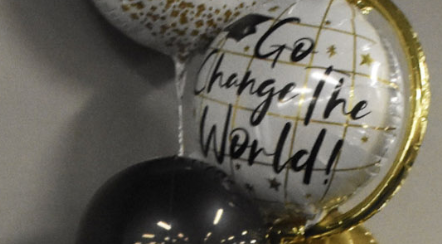The School for Adults teachers coaxed me to attend the Honors Program and General Education Diploma (GED) Graduation because I’m a volunteer tutor. I was somewhat reluctant since graduation usually means long speeches, uncomfortable seating, and potential boredom, but I’m glad I showed up. The pride of the students being honored touched me.
I followed the crowds of American-born and Spanish-speaking students and their families as they streamed in. All were dressed up—women in dresses and heels, men in fashionable clothes. In other families, the women wore special hijabs—dark colors embroidered with gold threads or embellished with gold sparkles along the cuffs. Everyone’s children wore their finery.

The place looked and sounded like a party—music played, a long table was laden with cupcakes and other sweets, and round tables were covered with pastel tablecloths ready for families to gather after the ceremony. I found a place at the back of the hall next to another tutor, a retired engineer from India who helps students with math.
My role is working one-on-one or with small groups to help adult learners improve their writing and reading comprehension. Some of the students are native English speakers who got off track and didn’t finish their high school degrees. Others are immigrants learning sufficient English so they can attend college or keep up with their children’s schoolwork. Some students have university degrees from their home countries but have to start over here with a GED. When I tutor students, I ask their goals, but I don’t ask why they dropped out of school or what their immigration status is.
I was pleased one of the GED graduates I know was a featured speaker. She’s in her early 20s and a native speaker, so her language skills are good. She didn’t need much from me–math was her nemesis. For four years she showed up, sitting quietly in the back when class met in person. During COVID, when classes and my tutoring went online, she was in and out of class, but she persisted.
Her speech was plainspoken but so heartfelt. Her pride in earning the GED, a milestone many of us take for granted, showed. Now, with the equivalent of a high school diploma, she plans to work full time to save money for college.
Another GED graduate I know is a woman from Sudan. Her written and spoken English are very good, she and was so skilled in math that she could have taught the class. I met with her once when she wanted an explanation of a writing assignment. She required a GED so she can pursue her dream of going to medical school.
A student speaker in his 30s spoke in heavily accented English about leaving Venezuela. He has a family and was established in his career, but political turbulence forced him and his family to leave. He spoke with passion about his gratitude for the opportunity America gave him. Now that he had his GED, he hopes to become an electrician and have his own business one day.
The majority of the students made level gains, meaning they advanced from basic to intermediate or from intermediate to advanced classes. Level gains merited a ribbon which students wore proudly. Their accomplishments are so hard won.
I am in awe of these students’ persistence. Their progress is slow. Many start and stop because they’ve changed jobs or don’t have daycare. Most don’t have time to do schoolwork at home. But week after week, year after year, they show up. I wonder how many of us who finished high school by 18, would work as hard to get a GED. The facts of their stories may sound ordinary, but for them, the diploma is life-changing.
So often I feel discouraged about the state of the world, but seeing the students’ pride and sheer joy in their accomplishments renewed my faith in humanity.

